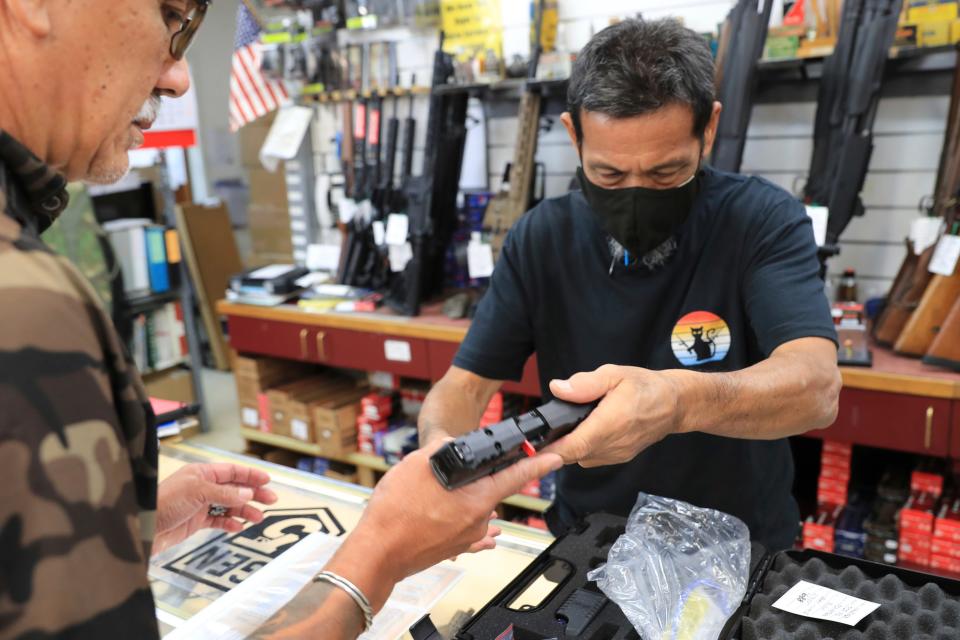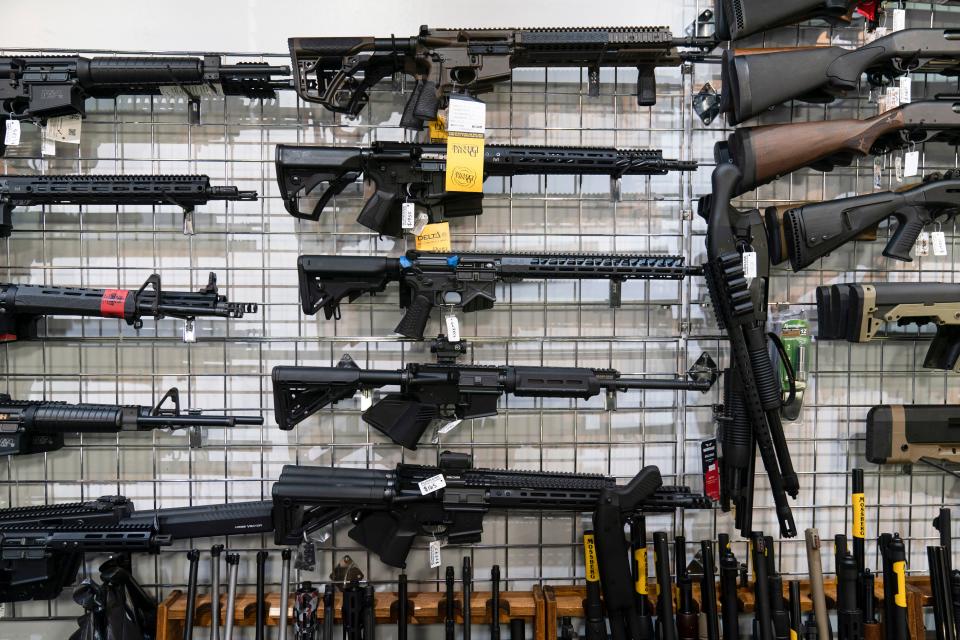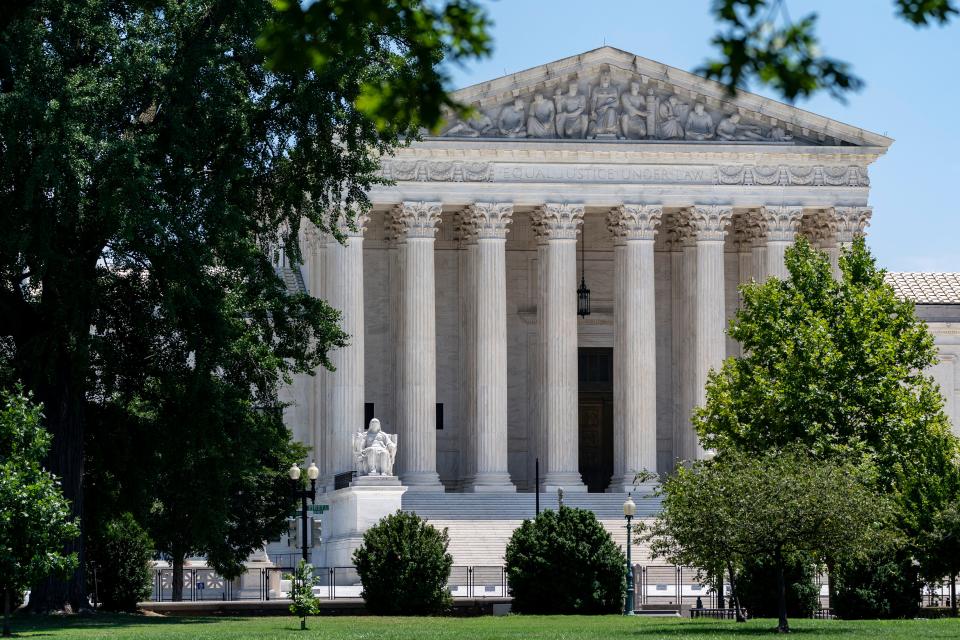Supreme Court's landmark guns ruling prompts race to test Second Amendment's limits

WASHINGTON – For Zellnor Myrie, there was no time to waste when the Supreme Court handed down its sweeping Second Amendment decision in late June, striking down New York's law regulating carry permits. The state senator from Brooklyn helped craft a series of gun restrictions that were signed into law days later.
"The public here in New York has been feeling a sense of urgency for quite some time," said Myrie, a Democrat and an architect of the legislation that banned guns on subways and in bars and ramped up training requirements to obtain a gun permit.
Things moved quickly on the other side of the debate as well: Dudley Brown, a longtime gun rights advocate, said he sensed a "totally new landscape" around the Second Amendment. Brown's National Foundation for Gun Rights revived a challenge to a ban on high-capacity ammunition magazines in Colorado that relies heavily on the Supreme Court decision.
Standards: Supreme Court's guns decision demands courts look to history, tradition
Places: Should guns be banned in bars, hospitals? Decision could spur new fight
The high court's landmark ruling on June 23 declared a New York law requiring residents to have "proper cause" to carry a handgun unconstitutional. That kicked off a race between groups supporting gun regulations and those opposed to them – intensifying the long struggle over the Second Amendment and inspiring an avalanche of laws and lawsuits.
Uncertainty around which laws will be upheld and which will be struck down has made the legal situation murky, even for those closely involved in the process.
"If any of this information appears confusing or contradictory it probably is," Frank Merola, a GOP county clerk in upstate New York wrote in a document explaining how carry permits would be handled after the Supreme Court ruling. "The County Clerk shares your frustration."

Gun laws on shaky ground
Unanswered by the court's decision is whether bans on certain semi-automatic rifles, high-capacity magazines or people under 21 carrying weapons are consistent with the Second Amendment. Some gun owners are concerned that place-based prohibitions – such as in parks or on subways and buses – will essentially make their carry permits worthless.
The uncertainty over what courts will allow looms as the nation grapples with shooting massacres this year at an elementary school in Texas, a grocery store in New York and an Independence Day parade outside Chicago, among others. Some states passed gun restrictions after mass killings.
"It really is a new scenario that we're encountering," said Alex McCourt, director of legal research at the Johns Hopkins Center for Gun Violence Solutions. "There's a fair amount of uncertainty both with what comes next – what laws will be struck down or upheld – but also how lower courts are going to use ... the majority's opinion to analyze gun laws in other cases."
Reaction: Advocates have hope for gun control after Buffalo, Uvalde shootings
Barrett: Justice wields enormous influence on the Supreme Court
Movement: Overturning Roe v. Wade follows decades-long push by conservatives
At issue in the Supreme Court case, New York State Rifle & Pistol Association v. Bruen, was a century-old state law that required residents to have "proper cause" to carry a handgun – in other words, a special need for self-protection greater than most people could demonstrate. An applicant who has to carry a lot of cash for work might have met the threshold, for instance.
Five mostly Democratic states – California, Maryland, New Jersey, Massachusetts and Hawaii – had licensing regimes similar to New York's, according to the court. That partly explains why those states have been among the fastest to respond to the court's decision.
The opinion by Associate Justice Clarence Thomas set a legal standard for lower courts to use when reviewing gun laws. To pass constitutional muster, the court said, a gun law must be "consistent with this nation's historical tradition of firearm regulation."
The challenge for advocates on both sides of the guns debate will be defining exactly what that means.
"It's fair to say that the Supreme Court ... pressed the reset button on Second Amendment litigation," said Eric Tirschwell, executive director of Everytown Law, which advocates for gun control. "But the gun safety community – the gun violence prevention movement – is very much prepared."

Blue states look to 'sensitive' place bans
New York's new law, which Democratic Gov. Kathy Hochul signed July 1, mandates 16 hours of training for concealed-carry permits and monthly checks of license holders for criminal convictions or orders of protection. It made carrying guns in bars and restaurants, houses of worship, parks and other "sensitive places" a felony.
Myrie said state Democrats read the courtroom in November, when a majority of justices signaled they had reservations about the New York law. So lawmakers worked on the legislation long before the high court handed down its decision in late June. The Supreme Court indicated states could make at least some "sensitive" places, such as courthouses, off-limits to guns.
"We weren't blindsided," said Myrie, whose district had a mass shooting in April. "When the court sanctioned the carrying of firearms in public – coupled with all of the shootings people have seen in the news – it made it incumbent on us to act quickly."
Alito: Justice Alito dismisses criticism from global leaders of abortion decision
Analysis: Supreme Court ends historic term with big shift to the right on abortion, guns
Opinion: Our take on self-defense? Don't sell us guns
Other blue states reacted quickly: New Jersey Gov. Phil Murphy, a Democrat, signed seven gun bills into law last month that required additional training for a license and prohibited .50-caliber rifles, among other provisions. California lawmakers are considering legislation that would impose new eligibility requirements for licenses to carry a gun while expanding gun-free zones. Massachusetts is weighing a bill to require police to conduct in-person interviews with those seeking to carry a gun.
"People are free to apply for firearms. We want to make sure our licensing authorities are considering who should actually get them. Who is a responsible gun owner and who is not?" state Rep. Michael Day, a Democrat who advocated for the proposed changes, said last month, according to The Boston Globe.
Day did not respond to a request for comment from USA TODAY.
Jim Wallace, executive director at the Gun Owners' Action League in Massachusetts, said that much of what lawmakers in Boston are contemplating will not only be ineffective at curtailing mass shootings but won't stand up in court. Wallace said gun control proponents are "trying desperately to hang on" to what the Supreme Court has already told them isn't allowed under the Second Amendment.
"They're going to do everything they can to not recognize it as a civil right," he said. "They're going to continue to put whatever hurdles that they can in front of good people."
Wallace and other gun rights advocates raised another issue that has cropped up since the high court's decision: an inconsistency in how quickly officials changed their licensing policies. Some, such as the New York City Police Department, are still reviewing application procedures. The department declined to respond to a question about how soon it would announce changes. City officials, including Brendan McGuire, chief counsel to the mayor, said the changes will be "consistent with the opinion" of the Supreme Court.
Nancy Lewandusky, an upstate New York resident who has had a carry permit for about a year, questioned the rush of legislation and what she sees as the slow reaction from licensing officials. Lewandusky is an office manager for the New York State Pistol & Rifle Association, the lead plaintiff in the case decided by the Supreme Court.
"They're restricting law-abiding citizens of their rights," she said. "Why are we focusing on people that have no criminal history? Why are we focused on those people when we should be focusing on the people breaking the law?"

Gun groups: Ruling is a 'wrecking ball'
Gun rights groups are kick-starting legal challenges to state gun laws – including new lawsuits and others that had been put on hold while the Supreme Court considered the New York case.
The Firearms Policy Coalition, for instance, sought to revive suits over a Pennsylvania law that bars people under 21 from carrying guns. The group challenged a federal lifetime ban on gun ownership for people convicted of certain crimes. In both instances – and others – the group points in court papers to the Supreme Court's decision in Bruen.
New justice: Jackson makes history as Supreme Court's first Black woman justice
Explainer: Five key sections in the Supreme Court's decision to overturn Roe v. Wade
Brown's group, the National Foundation for Gun Rights, filed a lawsuit in federal court last week challenging Colorado's ban on high-capacity magazines – which the state defines as those holding more than 15 rounds. The prohibition was enacted after a shooting in 2012 at a movie theater in Aurora, where 12 people were killed.
In a news release announcing the lawsuit, Brown's group described the court's decision in Bruen as a "4-ton wrecking ball for us to use against gun control laws."
Some gun laws may stand up, "but on magazine bans and semi-automatic – so-called assault rifle – bans, there's, near as I can tell, no way they can get out of this," Brown said in an interview. "Once the Supreme Court ... rules something is unconstitutional, you don't get to redefine it without an amendment."
Not so fast, gun regulation proponents say.
Tirschwell's Everytown Law has also been preparing for litigation. The group announced a new center days after the Bruen decision that will partner with state and local government attorneys defending gun regulations.
"It's certainly an unsettled time," Tirschwell said. "But we remain optimistic that ... as the dust starts to settle a little bit, the lion's share of gun safety laws will be upheld."
This article originally appeared on USA TODAY: Supreme Court guns ruling opens new fronts in Second Amendment fight
Solve the daily Crossword

